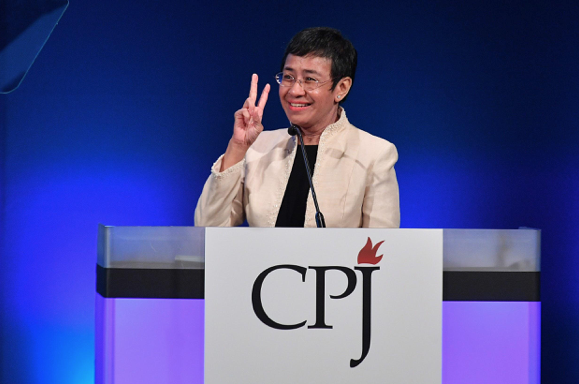Ahead of national elections in the Philippines on May 9, the State has stepped up its attacks on Nobel Laureate Maria Ressa and the news outlet she leads, Rappler.
“This dramatic escalation in the legal harassment of Maria Ressa and Rappler highlights the urgent need for the Philippines’ to decriminalize libel and do away with laws that are repeatedly abused to persecute journalists whose reporting exposes public wrongdoing. The State’s blatant attempts to suppress Rappler’s election-related fact-checking services is an unacceptable attempt to cheat the public of their right to accurate information, which is critical during elections,” said the Hold the Line Coalition Steering Committee.
Fourteen new cyber libel complaints have been made against Rappler in recent weeks, naming several journalists and their sources in connection with reporting on President Rodrigo Duterte’s pastor Apollo Quiboloy, who is on the FBI’s ‘most wanted’ list, and eight of his followers. Quiboloy and his associates were charged with conspiracy to engage in sex trafficking by force, fraud and coercion; sex trafficking of children; marriage fraud; fraud, and misuse of visas; and various money laundering offenses. Quiboloy’s company Sonshine Media Network International (SMNI), which has attacked independent journalists and news outlets reporting critically on the Duterte administration, was recently granted a TV license by the government.
In addition to these cases, Ressa has been named personally as one of 17 reporters, editors and executives, and seven news organizations in cyber libel complaints brought by Duterte government cabinet minister, Energy Secretary Alfonso Cusi. He alleges Ressa and the other named individuals and organizations “publicly accused [him] of graft” by reporting on a graft suit filed against him and a businessman. Cusi is demanding each of the accused pay him 200 million pesos (nearly US $4 million) in damages. Ressa did not write the article published by Rappler.
If the authorities choose to prosecute these cases, they will become criminal charges with potentially heavy jail sentences attached. Having already been convicted of one criminal cyber libel charge, which is under appeal, and facing multiple other pre-existing legal cases, Ressa testified before the U.S. Senate last week about the State-enabled legal harassment she experiences: “All told, I could go to jail for the rest of my life. Because I refuse to stop doing my job as a journalist. Because Rappler holds the line and continues to protect the public sphere,” she said.
In parallel, Rappler is facing another legal challenge, with the Philippines’ Solicitor General petitioning the Supreme Court to void Rappler’s fact-checking agreement with the Commission of Elections (COMELEC). As a result, this collaboration between Rappler and COMELEC designed to counter disinformation associated with the presidential poll has been temporarily halted – just over a month from the election.
“This new wave of cases and complaints, which represents an egregious attack on press freedom, is designed to undermine the essential work of fact-checking and critical reporting during elections – acts which help uphold the integrity of democratic processes. Rappler must be allowed to perform the essential public service of exposing falsehoods, particularly during the election period, even when these prove politically damaging for those in power,” the Coalition said.
Julie Posetti (ICFJ), Gypsy Guillén Kaiser (CPJ), and Daniel Bastard (RSF) on behalf of the Hold the Line Coalition.
For further comment, contact: jposetti@icfj.org, gguillenkaiser@cpj.org, dbastard@rsf.org
NOTE: The #HTL Coalition comprises more than 80 organizations around the world. This statement is issued by the #HoldTheLine Steering Committee, but it does not necessarily reflect the position of all or any individual Coalition members or organizations.
